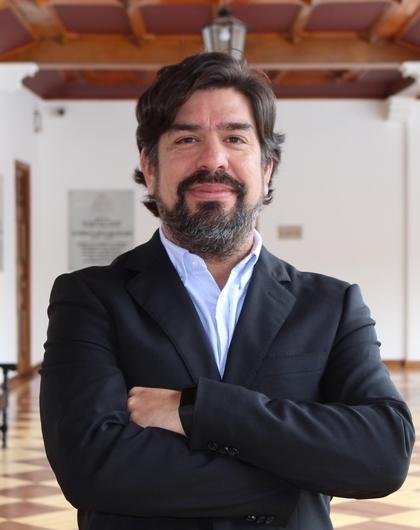Scholars
Matias Franchini
Universidad del Rosario
Based in
Colombia
South America
Matías Franchini is Assistant Professor of International Relations at the Faculty of International, Political and Urban Studies, Universidad del Rosario in Bogotá, Colombia. Originally from Argentina, he holds a PhD in International Relations from the University of Brasilia, Brazil. He was a Visiting Researcher at the Princeton School of Public and International Affairs, under the academic advice of Robert O. Keohane and a postdoctoral research fellow at the Institute of International Relations of the University of Brasilia. He is the author of several publications in the areas of environmental global governance, Latin American studies, and the international political economy of climate change.

Publications
Books
“Brazil and Climate Change: Beyond the Amazon,” with Eduardo Viola. Routledge, New York, 2018.
“Sistema Internacional de Hegemonia Conservadora: Democracia e Governança Global na Era da Crise Climática (International System Under Conservative Hegemony: Democracy and Global Governance),” with Eduardo Viola and Thaís Ribeiro. Annablume, Sao Paulo, 2013.
Book Chapters
“Climate Change Politics in Latin America and the Caribbean.” Oxford Research Encyclopedia of Politics. (2021).
Socio-Environmentalism, with Cristina Inoue. In: Tickner, Arlene; Smith, Karen. “International Relations from the Global South: Worlds of Difference,” Routledge, 2020.
Climate Security in Latin America and the Caribbean: Crime, Social Unrest and, Interstate Conflict, with Eduardo Viola. In: “Natural Resources and Policy Choices in Latin America.” França, G., Freire, D. & Mignozzetti, U. (eds.). Primera ed. São Paulo, SP – Brazil.: Konrad Adenauer Foundation (KAS), p. 189-210.
How credible are Latin-American Intended National Determined Contributions (INDCs)? In: Eduardo Viola (org.), “The World After the Paris Climate Agreement of December 2015.” CEBRI Dossiê, Special Edition, Volume 1, Ano 15, 2016.
Discounting the Future: The Politics of Climate Change in Argentina, with Eduardo Viola. In: Held, David; Roger, Charles; Nag, Eva. (Org.). “Climate Governance in the Developing World.” 1ed.Londres: Polity Press, 2013, v. 1, p. 113-133.
Climate Policy in Brazil. Public Awareness, Social Transformations and Emission Reductions, with Eduardo Viola. In: Ian Bailey and Hugh Compston (Eds.). “Feeling the Heat: The Politics of Climate Policy in Rapidly Industrializing Countries.” Hampshire: Palgrave, 2012.
Journal Articles
“De Lula a Bolsonaro: una década de degradación de la gobernanza climática en Brasil,” with Eduardo Viola and Ana Mauad. Análisis Político, 33(99), 81-100, 2020.
“Myths and images in global climate governance, conceptualization and the case of Brazil (1989 – 2019),” with Eduardo Viola, Revista Brasileira de Política Internacional, 62(2): e005, 2019.
“The Challenges of The Anthropocene: From International Environmental Policy to Global Governance,” with Eduardo Viola and Ana Flavia Barros. Revista Ambiente e Sociedade, vol.20 no.3 São Paulo July/Sept. 2017.
“Brazilian Climate Politics 2005–2012: Ambivalence and Paradox,” with Eduardo Viola. WIREs Climate Change, v. 5, p. 677-688, 2014.
“Brasil na Governança Global do Clima 2005-2012: A Luta entre Conservadores e Reformistas (Brazil in the Global Governance of Climate Change 2005-2012),” with Eduardo Viola. In: Contexto Internacional, PUC- RJ, Rio de Janeiro, 2013.
“Os Limiares Planetários, A Rio+20 e o Papel do Brasil (The Planetary Boundaries, the Rio+20 Summit and the Role of Brazil),” with Eduardo Viola. Cadernos EBAPE, v. 10, nº 3, artigo 1, Fundação Getúlio Vargas (FGV), Rio de Janeiro, September 2012.
“Climate Governance in an International System Under Conservative Hegemony: The Role of Major Powers,” with Eduardo Viola and Thaís Ribeiro. Revista Brasileira de Política Internacional (RBPI), 2012.
“Sistema Internacional de Hegemonia Conservadora: O Fracasso da Rio + 20 na Governança dos Limites Planetários (The International System Under Conservative Hegemony, the Rio+20 Failure and the Planetary Boundaries),” with Eduardo Viola. Ambiente e Sociedade. 2012, vol.15, n.3, pp.01-18.


